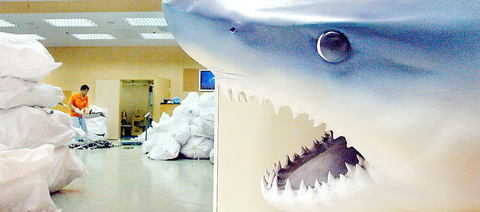Disney said yesterday it would stand by its decision to serve shark's fin soup at its new Hong Kong theme park, after winning support from the city's catering trade.
The US entertainment giant was attacked by conservationists last week for deciding to offer the controversial dish at the Disneyland hotel, when the US$3 billion theme park opens in September.
Green groups say Disney should set an example by not serving shark's fin, the harvesting of which they say leads to the slaughter of millions of sharks a year and has put some species at risk.

PHOTO: AFP
It also encourages the practise of "finning," where fishermen slice fins from sharks and throw the fish back into the sea to die, according to groups like the World Wide Fund for Nature and Greenpeace.
A legislator for the catering industry and the president of a restaurant trade group have backed Disney, saying it is being unfairly pilloried and would be a "laughing stock" if it did not offer the dish.
Tommy Cheung, the legislator representing Hong Kong's catering sector, said: "I don't believe sharks are an endangered species. Some species of shark may be, but not all shark's fin comes from certain species. There are a lot of species that are plentiful.
"I am not aware why people are making so much fuss about Disney. Many restaurants are serving shark's fin, so why pick on Disney?"
Cheung said it was unreasonable to expect the theme park to offer Chinese banquets without offering the dish.
"Chinese tradition is that you put shark's fin on the table," he said. "If you don't, you are not respecting the guests you invite. It is a matter of face."
David Ng, president of the Hong Kong Federation of Restaurants and Related Trades, said that people holding wedding banquets could be made to seem a "laughing stock" if they did not offer shark's fin.
"This is the traditional culture of Chinese people, and you can't say it is right or it is wrong," he said.
"No Chinese banquet would be complete without shark's fin soup. It is a dish that dates back maybe hundreds of years. You must treat your guests properly," he said.
A spokeswoman for Disney said there was no change in the decision to serve shark's fin soup at the theme park, despite the outcry from conservationists.
Disney takes environmental stewardship seriously but must also respect "local cultures," she said.
The dish would be served only on request and only as part of a Chinese banquet, she stressed.

Nvidia Corp chief executive officer Jensen Huang (黃仁勳) on Monday introduced the company’s latest supercomputer platform, featuring six new chips made by Taiwan Semiconductor Manufacturing Co (TSMC, 台積電), saying that it is now “in full production.” “If Vera Rubin is going to be in time for this year, it must be in production by now, and so, today I can tell you that Vera Rubin is in full production,” Huang said during his keynote speech at CES in Las Vegas. The rollout of six concurrent chips for Vera Rubin — the company’s next-generation artificial intelligence (AI) computing platform — marks a strategic

REVENUE PERFORMANCE: Cloud and network products, and electronic components saw strong increases, while smart consumer electronics and computing products fell Hon Hai Precision Industry Co (鴻海精密) yesterday posted 26.51 percent quarterly growth in revenue for last quarter to NT$2.6 trillion (US$82.44 billion), the strongest on record for the period and above expectations, but the company forecast a slight revenue dip this quarter due to seasonal factors. On an annual basis, revenue last quarter grew 22.07 percent, the company said. Analysts on average estimated about NT$2.4 trillion increase. Hon Hai, which assembles servers for Nvidia Corp and iPhones for Apple Inc, is expanding its capacity in the US, adding artificial intelligence (AI) server production in Wisconsin and Texas, where it operates established campuses. This

US President Donald Trump on Friday blocked US photonics firm HieFo Corp’s US$3 million acquisition of assets in New Jersey-based aerospace and defense specialist Emcore Corp, citing national security and China-related concerns. In an order released by the White House, Trump said HieFo was “controlled by a citizen of the People’s Republic of China” and that its 2024 acquisition of Emcore’s businesses led the US president to believe that it might “take action that threatens to impair the national security of the United States.” The order did not name the person or detail Trump’s concerns. “The Transaction is hereby prohibited,”

Garment maker Makalot Industrial Co (聚陽) yesterday reported lower-than-expected fourth-quarter revenue of NT$7.93 billion (US$251.44 million), down 9.48 percent from NT$8.76 billion a year earlier. On a quarterly basis, revenue fell 10.83 percent from NT$8.89 billion, company data showed. The figure was also lower than market expectations of NT$8.05 billion, according to data compiled by Yuanta Securities Investment and Consulting Co (元大投顧), which had projected NT$8.22 billion. Makalot’s revenue this quarter would likely increase by a mid-teens percentage as the industry is entering its high season, Yuanta said. Overall, Makalot’s revenue last year totaled NT$34.43 billion, down 3.08 percent from its record NT$35.52